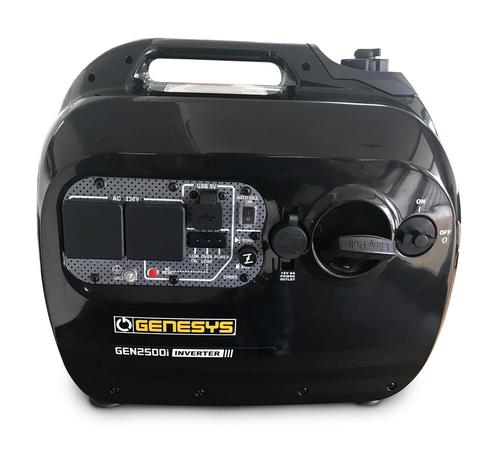What Generator To Use For Your Home?
19th Jun 2021
Selecting the right generator for your home and needs is made easy with our information guide. When the power goes out, a home generator will keep all the appliances of everyday life working to make life much more comfortable while waiting for mains power to return. Understanding the suitability of a generator first requires an understanding of how it will be used.
This guide explains the most important factors to consider, power demand and output capabilities, fuel, size, noise, price and performance. Whether you are seeking just an emergency backup or a more substantial installed standby generator, we have gathered a range of solutions to help guide a decision that is right for you. When choosing the right size generator for your home, here's what you need to know.
Firstly, What is a Generator?
To understand what a generator is, first you need to understand how a generator works.
A generator is a device that converts motive power (mechanical energy) into electrical power for use in an external circuit. Generators can be dispatched, meaning the system can turn them on as necessary. Electrical generators are standalone machines that provide electricity when power from the grid is unavailable, while industrial generators are used to supply backup or primary power to facilities, businesses, or homes during power outages.
How Much Generator Power Do You Need?
It is possible to buy a generator for just about any need; that need is dependent on power - so the first step in determining your generator is to work out how much power you will need.
Some electrical generators are small, portable devices used for camping or leisure activities and will provide small amounts of power for just a few devices. Others are permanent installations that can power an entire house. Industrial generators are even more powerful, capable of maintaining full power to manufacturing facilities, hospitals, and office complexes. There are portable generators, diesel generators, natural gas generators, propane generators, and petrol generators, to name a few.
Back to the initial calculation, determining the right size generator, you will need based on the following three steps
- List out every appliances/devices/tools you want to power
- Determine the starting and running wattage of everything on your list
- Add the wattage together and use this number to guide the size generator you now need. If you would like any assistance with this calculation, please contact our expert team on 1300 998 647.
Home Generator Types
Home generators can produce enough power to run your essential appliances and items around the home when mains power is interrupted. Think refrigerator, freezer, lights, radio, mobile charger, laptop, TV, fans – all those items that make everyday life easier when it counts. These generators can be categorised under three main groups: Propane Whole House Generators, Inverter Generators and Portable Generators.
Whole House Generators

Generac 8kVa Guardian Generator
A whole house propane (LPG) generator offers a permanent, reliable & compact backup solution for a home. They automatically switch on in the case of a power outage, providing power to your entire home. Powered by liquid propane gas (LPG), they can power a complete home due to their output range from 5,000 to 20,000 watts.
This generator style is convenient and reliable because all you need is an onsite storage tank and access to a road for delivery, or with a tank monitor installed, the supplier will automatically know when to refill. This LPG powered model generally requires less maintenance due to propane being a clean-burning fuel, resulting in longer-lasting performance and less impact on local air quality. The scope of models ranges from the smaller 8KVA models to the large 20KVA models, with a range of sizes in between.
Portable Generators
Genesys Portable 9kVa Generator
Home portable generators provide temporary power when and where it is needed. Appliances, power tools, or other devices can be plugged directly into standard outlets on the generator’s front panel, or some models can be plugged in to power circuits in a home via a manual transfer switch. Portable generators typically run-on fuel that may need to store in large quantities, they have an output range from 3,000 to 8,500 watts, and many models have options for electric starts. They are an affordable option to provide power during an outage but will only power a certain number of appliances, so best suited to short term, emergency use. Popular models range from the petrol 8KVA variety to devices sporting features like the diesel 5.8KVA with a silenced canopy.
Inverter Generators

Genesys 2kVa Inverter Generator
Inverter generators are used in homes for infrequent use or as insurance in case of an emergency or outages due to their long run times, affordability and capability to power a home's essential appliances. These generators produce clean power at a steady voltage, meaning the frequency of an inverter generator has minimal harmonic distortion or THD, so the device can power sensitive electronics like tablets, laptops, televisions, and other smart devices. They are a portable option that many people use due to their low cost, adequate run times and range of applications at home, for tools and camping. Models range from the very affordable Petrol 2.4KVA to the best value Petrol 3.65KVA to the most popular honda inverter generator as reviewed by our customers, the Honda 2.2KVA Inverter Generator – EU22i.
Other Considerations
Being prepared and having the right size generator is crucial to having the necessary appliances running while you have no power and relying on your generator.
Home generators are categorised by output size, measured in watts. The number of appliances you will run simultaneously will depend on the amount of power output, with the quality and consistency of that power controlling how well the appliances will run.
Powering a whole house of appliances is generally achieved with a 5000-watt model - but to confirm the exact generator size, calculate the total wattage of all appliances to run in an outage to guide the required power load/generator.
Once the size is identified, there are three options to choose from; the standby whole house generator is installed permanently and run on natural gas or the portable and inverter generators both great for use around the home, but typically as a backup power source.
A final consideration we know is worth mentioning is the installation of a transfer switch. This switch safely connects a home standby or portable generator to the homes circuit panel via one cable. For standby models, the switch will automatically turn on, and the switch will need to be manually turned on during an outage for the portable models.
Conclusion
Whole house generators can provide standby or backup power to keep home systems and appliances powered up whenever separation from the power grid occurs.
They supply automatic emergency power within seconds of an outage and are flexible enough to power an entire home or a few designated circuits. When selecting the best generator for home backup, consider models with special features that run the unit more quietly, are fuel-efficient and have low maintenance.




